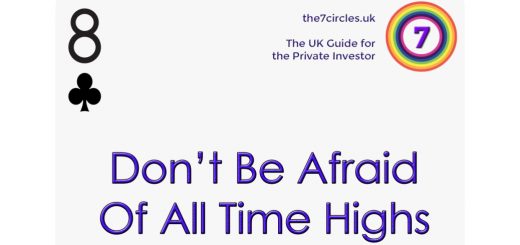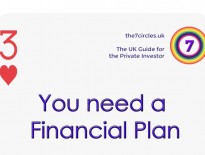3♣ — Taxes Matter
Taxes matter - because you can't spend pre-tax-income.
This post is part of the MoneyDeck series, a pack of 52 playing cards that describe 52 “golden rules” for Private Investors in the UK.
Taxes matter – because you can’t spend pre-tax-income.
Like the fees you pay your investment managers, taxes wear away the soap. Every pound you pay in taxes is a pound you can’t spend, or even better, save.
And the magic of compounding means that over time, the difference between a pre-tax and a post-tax investment will become bigger and bigger.
Taxes also matter because they affect real-world decision-making.
Before deciding whether to go for that new job, or ask for a pay rise, you need to know how much difference it will make. Not what the number on your contract looks like, but how much cash you will have in your pocket.
The same goes for investments. It’s the after-tax return that matters, not the gross.
The good news is that for the typical investor in the UK working towards financial independence, taxes are pretty easy to avoid.
Nobody likes paying taxes, but legally you can’t evade them. ((You can, however avoid them, since this is merely the term for sensible tax planning ))
The UK tax system is famously long and complicated, built from hundreds of piecemeal bottom-up revisions. rather than a regular top-down re-design. But in practical terms for most people it is quite simple.
We don’t have the many deductions available under the US system, so our tax returns are straightforward. Many people have everything done for them by their employer.
Before looking at the main UK taxes, let’s talk for a moment about the morality of tax avoidance.
The public definitely holds tax avoiders in poor regard, and seems unable to distinguish them from tax evaders. ((To be clear, the former use legal methods and the latter break the law ))
Pollsters find a majority think avoidance is “unacceptable”, but I have issues with their methodology.
I also think that the majority of people have never had to do any tax planning, and so they think there is something shady about it. No doubt the activities of multinational corporations such as Starbucks, Amazon and Google have something to do with it as well.
For me, making use of government-created allowances and products such as SIPPs, ISAs and VCTs has nothing in common with trans-national profit shifting to low-tax jurisdictions.
The government wants us all to save for our old age, and incentivises us to do so with favourable tax conditions. I can’t be doing anything wrong if I take them up on their offer.
The basic idea behind tax is that if you benefit from public goods and services, you should pay your fair share. If not, you are a free rider.
The first problem comes with defining “fair share”. We each use different amounts of different services, and some not at all.
And if you use more, or benefit from more, how much more tax would be / is fair? A hundred people would probably give you a hundred answers.
In the UK income tax is not hypothecated, so we can’t opt out of paying for things we don’t like or don’t need.
So we all pay taxes that we don’t want to. Peace-mongers pay for the military, the child-free pay for schools, the young and healthy pay for the NHS.
For more on the morality of tax avoidance, look here.
Tax-planning is all about efficiency. The annual allowances are generous – £55K pa between SIPP and ISA, more than enough for anyone – but they disappear each year on 5th April.
To really take advantage, you need to save each year.
If you have any spare cash left in April, it’s more efficient to put in into a SIPP. Take advantage of a time-bounded allowance and reduce your tax bill – a tax bill that is only worked out at the end of the year, after you’ve invested. Until then, any tax is hypothetical
No real tax is avoided – you just owe less than if you had made some different decisions about what to do with your money.
It’s no more morally ambiguous than shopping around for the best price for car insurance or electricity, or comparing the Tesco price for a TV with that of Amazon.
Let’s take a look at the main taxes. By far the most important for investors is income tax, and its baby brother, national insurance.
For most people, income is the source from which you must fund your investments. And when you come to spend your cash in retirement, you have to convert it back into income again.
Income can be the salary from your job, your pension, interest on cash in the bank or dividends from companies you own or even rent from spare properties.
They are each treated slightly differently:
- salaries have national insurance contributions (NICs) deducted as well as income tax
- NIC notionally funds your state pension, but the funds are not directly allocated towards this
- NI runs at 12% up to £42K, and 2% thereafter; your employer also pays NI on your salary
- there are allowances (£10K pa for income tax and £8K for NI) that mean the first part of this income is tax-free
- above certain thresholds (the first is £43K at the moment) the basic tax rate of 20% increases to 40% and then to 45%
- above £100K pa, the income tax annual allowance is gradually withdrawn
- for those on the lowest incomes, there is the third factor of benefit payments and in particular Tax Credits, both of which operate as a negative tax on income
- pensions are not subject to NICs
- the first £1,000 pa of saving interest will be tax-free from April 2016
- the first £5,00 pa of dividend interest will be tax-free from April 2016
- rental income has deductions for mortgage interest, maintenance and repairs before it is added into the general income pot
The main way to reduce your income tax bill is to make pension contributions. The first £40K pa that you (or your employer) put into your SIPP is tax-free. ((From April 2016, those on high incomes will see this allowance tapered down towards a base level of £10K pa ))
Employer contributions are also free of NICs, and if you use salary sacrifice you can increase these.
SIPPs also grow tax-free up to a limit of £1M, but income cannot be taken until age 55. This income is taxable apart from the first 25%, which is tax-free.
Once you have used up your SIPP allowance, the only other income tax shelters are VCTs and EISs.
In my opinion, EIS is too risky for all but the hardened venture capital angel, but pooled VCTs are worth a look for those on incomes of £90K or more.
If you want more detail on income and taxes, look here.
The second big tax for investors is capital gains tax (CGT), paid on the profits of things that you sell for more than you bought them for.
SIPPs are free of capital gains tax, as are ISAs (and VCTs and EISs). We haven’t mentioned ISAs so far because they don’t include income tax relief on the way in.
They are tax-free when you take money out, which makes them a good match for SIPPs, which are 75% taxable at the back-end.
Your primary residence is also free of CGT, which makes buying a house – and up-sizing / down-sizing during your investment career – part of tax-planning in the UK.
The other way to avoid capital gains tax is to use spread-bets – gambling profits are tax-free.
This apparent generosity from the taxman is easily explained – most gamblers lose money, and the government doesn’t want to make gambling losses deductible against tax.
The other main taxes are transactional – paid as you spend money – VAT and stamp duty.
- VAT at 20% is a big deal, but it’s hidden inside prices and is impossible to avoid.
- Stamp duty is also high (especially on expensive houses) but the only way to avoid it is to reduce the number of transactions you make.
- So be sure that you are prepared to live in that shiny new flat for twenty years.
There is also inheritance tax to consider, but since it is applied after your are dead, it falls into a separate category of end-of-life planning, and we won’t look at it here.
If you are efficient, and you do regularly take advantage of tax-shelters, what sort of benefits can you expect?
These depend on four things:
- the rate of tax relief that you qualify for on the way in
- the length of time you are invested for
- the real (after-inflation) growth rate of your investments
- the tax rate you are subject to when you take your money out
So there is no single answer to this question.
We looked at the potential benefits in some detail in our article on SIPPs vs ISAs.
- we compared two rates of tax relief – 20% and 40%
- and five investment periods – 10, 15, 20, 30 and 40 years
- and two growth rates – 2% real pa and 4% real pa
- and two withdrawal levels – £25K pa and £42K pa
- the former has an average tax rate of 7% and the latter 10.2%
At the time, we didn’t directly compare the products to investment outside of a tax shelter. I’ve worked out those numbers today, using simplified assumptions about the tax that would be paid on investment growth.
I’ve added the extra table to the SIPPs vs ISAs page, but here are a few highlights:
- the best results are achieved by investing in a SIPP with 40% tax relief, and then withdrawing the money at £25k per year
- the worst results are achieved by a 40% tax payer who doesn’t use a tax shelter
Let’s look at a couple of cases in detail. First, a 40% tax payer who invests for 10 years at 4% real growth:
- someone who doesn’t use a tax-shelter will grow £1,000 into £1,268
- an ISA investor will have £1,480
- a SIPP investor will have £2,214 if they withdraw £42K per year, or £2,294 if they withdraw £25K per year
So even after only 10 years, the difference between worst and best case is an extra 81%.
Over longer-time periods the differences grow. Here’s the same person after 40 years at 4% real growth:
- the person who doesn’t use a tax-shelter now has £2,582
- an ISA investor will have £4,801
- a SIPP investor will have £7,182 if they withdraw £42K per year, or £7,442 if they withdraw £25K per year
Over an investment lifetime, the difference between the best and worst outcome could be 188% or more.
For more detail on the comparisons across many different sets of circumstance, look here.
Taxes are unpleasant, but for the UK investor, they are to a large degree avoidable. Government-sponsored schemes have generous annual allowances to suit most purposes.
So use up your SIPP and ISA allowances as much as you can each year.
And remember, taxes matter – because you can’t spend pre-tax-income.
Until next time.


















Death and Taxes…… always important to remember how they got Al Capone.
I’m one who is fortunate to earn enough to use all my allowances, and have to invest taxable….and I’m always shocked to realise someone people don’t use them.